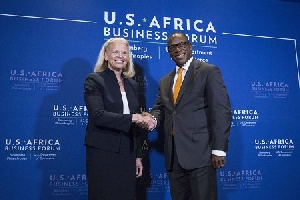- Home - News
- TWI News | TV
- Polls
- Year In Review
- News Archive
- Crime & Punishment
- Politics
- Regional
- Editorial
- Health
- Ghanaians Abroad
- Tabloid
- Africa
- Religion
- Election 2020
- Coronavirus
- News Videos | TV
- Photo Archives
- News Headlines
- Press Release
Business News of Thursday, 7 August 2014
Source: GNA
Fidelity Bank inks 5-year deal with IBM
Ghana’s Fidelity Bank has announced its choice of IBM to manage its technology infrastructure and services.
The five year deal will help the bank deliver advanced customer services and secure its reputation as a dynamic financial services institution in West Africa, according to a statement from IBM to the Ghana News Agency.
Currently one of the largest banks in Ghana, Fidelity Bank Ghana Limited is seeking to enhance its operational efficiencies as it embarks on a new strategic direction, developing growth plans and strategies for new markets, products and services.
Fidelity Bank was licensed by the Bank of Ghana (BoG), the local industry regulator, in 2006; and has made tremendous strides in the past 7 years to become a Tier1 Bank.
The quality of its product offerings and its high professional standards has propelled its franchise into a leading Ghanaian brand. The bank now has a balance sheet of USD $1billion (approx.).
Fidelity Bank’s choice of IBM to manage the administration and governance of its technology assets and operations will further entrench its position as a leading, financial institution in West Africa.
The aim of the technology management services deal is to ensure stability in the bank’s operations nationwide and help drive its projected exponential growth, as it seeks to become one of Ghana's top 3 banks in the next 5 years.
To support the bank’s goals, IBM will combine local and international expertise, including round-the-clock technical support from IBM's international Global Delivery Centers to ensure the bank achieves cross-channel integration and a seamless customer experience across all its touch-points.
The IBM-managed services will cover a broad spectrum of the bank’s IT functions, including management of its server, security, storage, networks, end user services, branch IT support, ATM infrastructure support and datacenter services.
“Our bank enjoys an exceptional reputation that results from the dedication and hard work of our employees and our incomparable products and services,” said Edward Effah, Managing Director, Fidelity Bank.
“In the rapidly changing Ghanaian banking industry, with far more players and competition than ever before, consumers are entitled to expect benchmark service and protection from these unique market challenges. It is my belief that our partnership with IBM will enable us to deliver and exceed these stakeholder expectations.”
The Ghanaian lender earlier chose IBM’s datacenter solution for a successful retooling and upgrade of its technology assets.
“The economy is going through a unique phase in its evolution and increasingly we are seeing that the appropriate deployment of technology solutions and services in the nation’s financial services sector will be key to boosting the growth momentum already achieved in the sector and by extension in the macro-economic environment,” said Joe Mensah, Country General Manager, IBM Ghana.
The list of banks around the world turning to IBM for support continues to grow. Whilst 70% of the world’s data is managed on IBM systems, 95 of the top 100 banks worldwide use IBM business or technology services to run their business.
IBM has also announced more than 20 banking deals throughout Africa over the last five years, with Kenyan, Ghanaian, Nigerian and Congolese banks turning to IBM for world-class IT solutions.
IBM has a long history in Africa, and is taking its role as a technology leader seriously, helping to boost the capacities of Africa’s people and institutions.
Just last year, IBM opened its first African Research Laboratory, the 12th globally and part of IBM's $6 billion annual spend on research alone.
In the past 5 years, the company has set up offices in Angola, Mauritius, Tanzania, Senegal, Ghana, Nigeria and Kenya and now has more than 20 subsidiaries on the continent.
A robust IT operating environment managed by IBM will help Fidelity management concentrate on Business Strategy and enable the bank to pursue its aggressive growth strategies.











